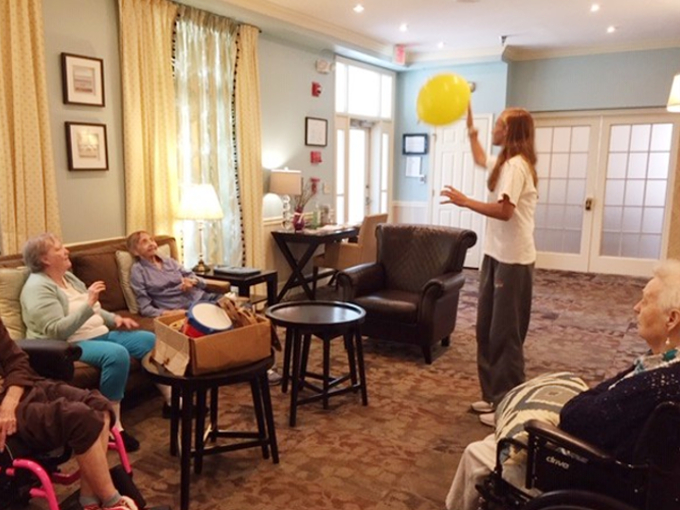 Hospice care provides a safe, nurturing environment for adults in the final stages of life or with a terminal illness. Some seniors receive end-of-life care at home, while others prefer assisted living hospice services. People often picture a nursing home when hospice care is mentioned, but assisted living facilities such as Bel Air can also provide hospice services. Learn more below about our end-of-life services for Maryland seniors, including hospice options, palliative care and memory care.
Hospice care provides a safe, nurturing environment for adults in the final stages of life or with a terminal illness. Some seniors receive end-of-life care at home, while others prefer assisted living hospice services. People often picture a nursing home when hospice care is mentioned, but assisted living facilities such as Bel Air can also provide hospice services. Learn more below about our end-of-life services for Maryland seniors, including hospice options, palliative care and memory care.
When Is It Time for Hospice Care?
Family members and caregivers often begin discussing hospice benefits when treatment is no longer an option for a disease or condition. Over time, a condition such as stage 4 cancer may stop responding to medical care. Some potential hospice patients also discontinue invasive treatment plans by choice and decide to let symptoms progress naturally rather than have surgery or other invasive treatments. Regardless of why treatment is discontinued, hospice care usually starts when a patient has a 6-month life expectancy.
Memory care is also something that drives caregivers or family members to seek hospice services for their loved ones. Patients with advanced dementia or Alzheimer’s may benefit from assisted living hospice care. Health care services for memory care patients, even those who aren’t receiving hospice care, are available 24 hours a day, seven days a week at our Maryland community.
Are Palliative Care and Hospice Care the Same Thing?
Palliative care can begin as soon as you or a loved one receives a major diagnosis. Hospice care is reserved for the end stages of your condition. With palliative care, the focus is on management of a serious health condition to maintain quality of life, rather than a more aggressive treatment that may have serious or uncomfortable side effects. Unlike hospice, when you are receiving palliative care, you can still receive active medical treatment for your symptoms, such as chemotherapy, immunotherapy, or physical therapy, and there is no set life expectancy for enrollment. Individuals in hospice receive comfort care, such as pain management solutions, but generally not active treatment. That’s the main difference between palliative care and hospice care.
Our staff members can provide compassionate care through every stage of your condition. We understand that every day counts, and our care team is here to keep each resident comfortable for as long as they need, and supporting the level of treatment that residents and loved ones decide to pursue.
What Does Hospice Care Provide?
Hospice care is personalized based on the needs and desires of each resident at Bel Air. For example, symptom management may look different for patients with advanced cancer than for residents of our memory care community who have Alzheimer’s or dementia. Our team members will help you work with the hospice agency of your choice to develop a custom plan of care either before you join our community, or if your loved one’s illness develops after joining the community. Here are some things you may want to request:
- Assisted living services such as help with toileting, grooming, meal preparation or cleaning
- Spiritual and emotional support as you cope with the changes you’re experiencing
- Family meetings and caregiver updates that keep loved ones in the loop about your care and how it impacts you
- Memory care services that help residents and family members understand the final stages of Alzheimer’s and similar conditions
- Bereavement services that help family members or caregivers cope with the grief of losing a loved one
Hospice care recipients can also enjoy all the amenities other residents at Bel Air enjoy, including ice cream socials, card games, religious services and gourmet meals prepared by a skilled chef. Residents who prefer to relax in their private suites can watch cable television or visit with guests 24/7.
Does Insurance Cover Hospice Care?
Home hospice services provide nursing assessment and oversight but require the family to provide the majority of personal care and medication management for their loved one. In many cases, families decide that they are not able to provide the care their loved one needs at home, since hospice providers only come to help for a few hours per week. In these cases, the family often looks into transferring care to an assisted living facility. Having hospice care in an assisted living allows family members to just ‘be’ with their loved ones. Families are able to hand over the caregiving to our staff, rather than becoming stressed and overwhelmed trying to provide extensive hands-on assistance themselves.
Some long term care insurance plans cover assisted living costs when an individual is receiving hospice services. In most cases, the service from the hospice agency is fully covered by private insurance programs, Medicaid and Medicare. Benefits vary based on your personal policy and medical needs, which is why we help all our community members develop a customized plan of care.
We understand that navigating insurance policies can get tricky, so we’re happy to explain your financial options for assisted living hospice care at Bel Air. We’ll also describe our specialized health care services in detail, such as memory care and other services for patients with chronic conditions, so you can decide if our facility is the right fit for your family.
Why You Should Consider Bel Air for Assisted Living Hospice Care
Choosing the right facility or community for end-of-life care is a major decision for many caregivers. After all, you want your loved one to be safe, happy and comfortable during their final days and have good quality of life. We treat every resident like family at Bel Air and make sure each community member receives quality care. You can count on us to provide prompt attention in a kind, courteous manner every day, in every way.
Reach out to our Maryland assisted living community for information on hospice care, whether you have questions about temporary respite stay for seniors who are doing in-home hospice or need a long-term senior living solution for residents with memory care, cancer or other conditions.




